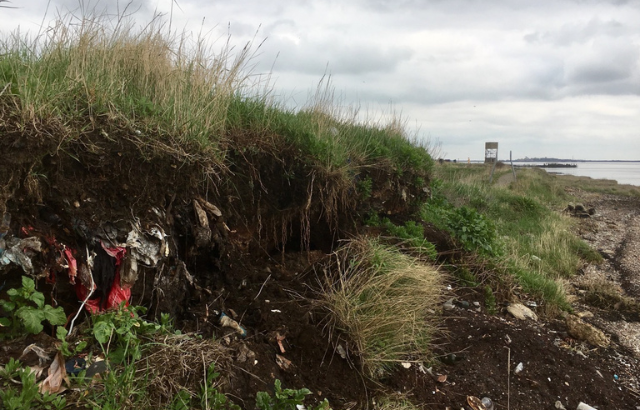One in ten historic coastal landfill sites in England are at risk of erosion
Coastal erosion may release waste from ten per cent of England's historic coastal landfills in the next forty years, according to research from Queen Mary University of London and the Environment Agency.
![Excavating a trial pit, Leigh Marshes [Credit: James Brand]](/media/qmul/media/news/items/hss/2017-images/item200869.jpg)
Excavating a trial pit, Leigh Marshes [Credit: James Brand]
There are at least 1,215 historic coastal landfill sites in England, mostly clustered around estuaries with major cities, including Liverpool, London, and Newcastle on Tyne. An investigation by researchers, published today in WIREs Water finds that 122 sites are at risk of starting to erode into coastal waters by 2055 if not adequately protected.
Historically it was common practise to dispose of landfill waste in low-lying estuarine and coastal areas where land had limited value due to the risk of it flooding. Historic landfills are frequently unlined with no leachate management and inadequate records of the waste they contain, which means there is a very limited understanding of the environmental risk posed if the waste erodes into estuarine or coastal waters.
Proximity to environmental sites
The researchers show that more than one-third of England's historic coastal landfills are in close proximity to designated environmental sites, and half of them are in or near to areas influencing bathing water quality. Some historic coastal landfills, such as the East Tilbury landfill in the Thames Estuary, have already started to erode.
Dr James Brand, Research Fellow at QMUL's School of Geography and lead-author of the research, said: "Although the majority of England's 'at risk' historic coastal landfills are currently being protected from erosion, some have already started to erode and release waste. Climate change effects, e.g. sea level rise and more intensive storms, are likely to increase the number of historic coastal landfills that erode."
Strategies to mitigate the risk of contaminant release from historic landfills such as excavation and relocation or incineration of waste are prohibitively expensive.
James added: "Currently obtaining funding for remediation works is challenging and very limited. We need to understand the risk of pollution from historic coastal landfills and determine appropriate management options for the future. It's essential to identify which sites pose the greatest pollution risk in order that resources can be prioritised."
Kate Spencer, Professor of Environmental Geochemistry at QMUL, added: "Unfortunately, there are a lot of unknowns here. Our research helps with the first piece of the puzzle: we now know where the high-risk sites are. What we know less about is what will happen when these landfills fail. Some of these sites include everything from coal ash, to micro plastics, to household waste. We don't necessarily know what's in there, and we can't say with confidence what will happen when the contents are exposed." Professor Spencer led the Environment Agency funded project into historic landfills at QMUL.
Related items

10 December 2024

10 December 2024
For media information, contact:
